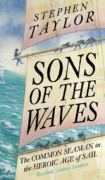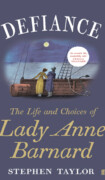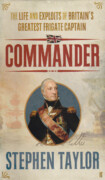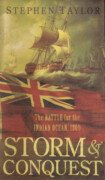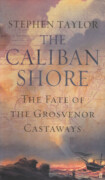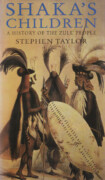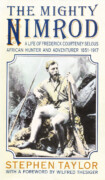
STORM AND CONQUEST:
The Battle for the Indian Ocean, 1809
Faber and Faber, London, and W.W. Norton, New York, 2007.
Book of the Year – Jeremy Paxman’s choice
By 1809 the Indian Ocean was the final battleground for Nelson’s Navy and France. At stake was Britain’s commercial lifeline to India – and its strategic capacity to wage war in Europe.
In one fatal season the natural order of maritime power since Trafalgar was destroyed. In bringing home saltpetre for the Peninsular campaign, Britain lost 14 of her great Indiamen, either sunk or taken by enemy frigates. Many hundreds of lives were lost and the East India Company was shaken to its foundations. The focus of these disasters was a tiny French outpost in mid-ocean – the island now known as Mauritius.
From the cover: Storm and Conquest brings together the terrifying ordeal of men, women and children caught at sea in hurricanes, and the seafarers who survived to drive the French from the Eastern Seas. India was a precarious place for them all, at once magnificent and terrifying. The drama of Stephen Taylor’s masterful narrative is irresistible; his true stories more than a match for the novels of Patrick O’Brian. And he provides a meticulously researched, searing portrait of the British captains whose zeal and ambition was such that they would rather die than surrender. Prime among them is Captain Robert Corbet, savage with his men, terrifying in battle.
REVIEWS
“Taylor has written a ferociously good book that is propelled rather than weighed down by the history that he mines so deftly. He puts you on the wooden decks of the Indiamen and keeps you there until his incredible tale is done.”
– Sebastian Junger, author of The Perfect Storm
“For sheer excitement, what most gripped me was Storm & Conquest. The battle for control of the Indian Ocean was the last great naval campaign against the French, and Taylor manages to refine accounts from the captain’s logbooks, diaries and letters into a narrative as thrilling as anything by Patrick O’Brian.”
– Jeremy Paxman, Books of the Year, Observer
“A triumph, a brilliant evocation of passages to and from India, built around Taylor’s impressive ability to paint vivid pictures of shipboard life complete with intrigues, dramas, romances and tragedies. An extraordinary cast of (mostly doomed) characters float across the pages … This is that rarest of works: a ripping yarn founded on original research … We can taste the salt, feel the damp, and smell the fear in a book that represents popular maritime history at its very best.”
– Huw Bowen, The Guardian
“No straightforward battle narrative but a stunning hodge-podge of conflicts, character studies, adventure and dubious goings-on in the East … Taylor is a great man for storms and desperate enterprises, as his previous books have shown, and in this irresistible volume he demonstrates his steady scholarship too. Like the best captains, he steers a practised course among the rivalries, bloodsheds and absurdities, never losing his head or his way.”
– Jan Morris, The Times
“Following The Caliban Shore, his narrative of the wreck of the Grosvenor in 1782, Stephen Taylor examines another Indian Ocean story – at once less familiar, more complex, and darkly fantastic – that focuses on the interplay of strategy, commerce, empire and power … His thoroughly researched and strikingly told tale combines a first-rate narrative with crackling plot lines, beautifully drawn and skilfully developed characters, set against a majestic, all-powerful ocean.”
– Andrew Lambert, Times Literary Supplement
“A magnificent book largely culled from the logs of the captains of the Indiamen – the merchant ships speeding India’s wealth to Britain … The writing has all the nautical salt and pungency of a Patrick O’Brian novel.”
– Literary Review
“Stephen Taylor has undertaken some serious documentary research and has new facts and interpretations to offer. This is popular rather than scholarly history, but it is well judged and well written, and it will give pleasure to many readers, while introducing them to a little-known but important campaign.”
– N.A.M. Rodger, English Historical Review
“Admirably well researched and well written … As riveting as Taylor’s lively narrative are the characters … He tells this remarkable tale with that quality that Nelson fostered in others – infectious zeal.”
– The Daily Telegraph
“Taylor’s excellently written and meticulously researched new book contributes significantly to a reassessment of the part played by the Indian Ocean in British policy and power … Part of the success of this book is the author’s ability to take the reader into the cabins of these ships, recreating not only the conditions and events but also the feelings, hopes and fears of those on board … [but] the real success is the deft touch with which he sketches the protagonists in the drama. … Taylor is a considerable figure in the writing of popular maritime history. His previous work includes a fascinating study of the Grosvenor and the fate of its survivors … To this impressive list can now be added Storm and Conquest.”
– John McAleer, International Journal for Maritime Research
“An original and skilfully written book. Stephen Taylor is not an academic historian, but he has combed the archives with the perseverance of a precise scholar. He is entirely at home with ship design and seamanship. His shrewd, detailed assessments of the naval officers are masterly . . . A great deal of work has gone into this book and it shows. Historians, naval and mercantile, social and economic, should read it.”
– Roger Knight, International Journal of Maritime History
“This magnificent and exciting book has all the cut and thrust of the Hornblower stories or Patrick O’Brian’s Master and Commander.”
– Conde Nast Traveller
“Ships in tempests are familiar territory for Taylor. But there is far more, for the value for much of his book is his wonderful characterisation of the eccentric and the absurd as well as the tragic … Taylor sweeps us along with gusto, but never loses sight of the overall dimension … This shows once again the author’s penchant for lost history.”
– Oxford Times
“Taylor’s chronicle is a fascinating insight into the Mauritius campaign … He portrays vividly a sweep of ocean and time that made and destroyed reputations, enhanced and ended lives, and which had a material influence on the war. Other histories recount the dates, detail and outcome, but few do quite as entertainingly and with such knowledge.”
– Glasgow Herald
“This book is history – but almost reads like a novel thanks to the skills of the author. The standard of storytelling is superb, with Taylor really bringing the main characters to life … History of the finest order, and hard to put down.”
– Birmingham Mail
“Taylor has a talent for rummaging in obscure corners of the past, as evidenced by his previous book The Caliban Shore. Ferreting through ships’ logs and official reports, he has compiled a narrative that’s as gripping as anything by Forrester or O’Brian.”
– South China Morning Post

